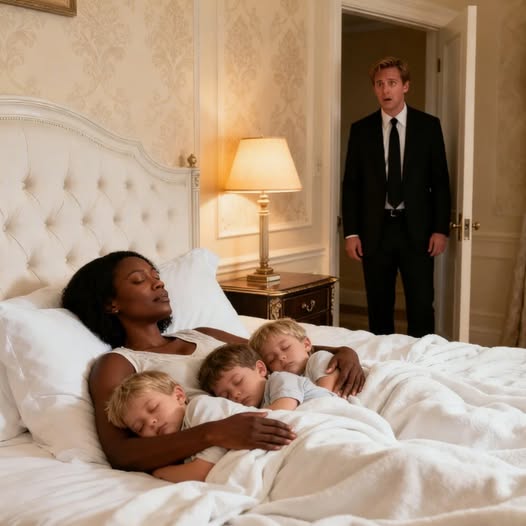When people talked about Ethan Carter, they talked about wealth. Oil fields. Private jets. Deals that shifted entire markets. His mansion in Lagos looked like something lifted out of a dream—marble floors, chandeliers brighter than noon, staff who moved so quietly it was easy to forget they were there. But behind the polished perfection lived three children who didn’t care about any of it.
Daniel, David, and Diana — triplets, six years old, brilliant, stubborn, and wild. Their mother had died giving birth to them, and Ethan had never figured out what to do with the grief that pressed on the walls of his home. So the mansion stayed immaculate… except for wherever the kids stood. Or ran. Or screamed. Or plotted.
In five months, they had burned through twelve nannies. One quit mid-shift and walked out barefoot. Another locked herself in the pantry until security escorted her out. A third left shouting that the children were “tiny demons with trust funds.” Every time, Ethan threw money at the problem, hoping it would fix itself. It didn’t.
Into this chaos walked Naomi Johnson, a thirty-two-year-old widow with calm eyes and a steady posture that suggested she’d seen worse than temper tantrums. Her daughter, Deborah, was in the hospital with a failing heart condition. Naomi didn’t have the luxury of turning down work; every bill mattered. She needed the job, but she also carried a quiet depth — the kind that comes from surviving life’s uglier edges.
The housekeeper, exhausted from training a dozen nannies who didn’t last past lunchtime, handed Naomi a uniform like she was handing her a warning. “Start in the playroom,” she said, voice flat. “That’s where they usually break people.”
Naomi walked in — and it was almost cinematic in its chaos. Juice streaked down the wall like modern art. Toys were scattered in a way that looked less accidental and more tactical. Paper bits covered the carpet like confetti after a riot. And the triplets… well, they were in their own world. Daniel launched a toy truck across the room. David was pouring cereal onto the floor, clearly enjoying the rebellion of it. Diana glared, daring Naomi to react.
Most nannies had started yelling by now.
Naomi did something else.
She tightened her scarf, stepped over the cereal, picked up a mop, and quietly got to work.
Her silence was so unexpected it disrupted their momentum. Daniel’s truck landed with a sad little thud. David froze mid-pour. Diana’s scowl wavered.
“Aren’t you going to stop us?” Daniel demanded.
Naomi didn’t look up. “Children don’t stop because someone yells,” she said calmly. “They stop when no one joins their game.”
That single sentence reset the entire room. The chaos didn’t know how to respond to calm.
From the upstairs balcony, Ethan watched in disbelief. He had seen screaming matches, breakdowns, and bribes. What he had never seen was someone refuse the battle entirely.
The next morning at dawn, Naomi was already sweeping the marble stairs, humming a tune older than the house itself. When the triplets stomped into the dining room demanding ice cream for breakfast, she didn’t flinch.
“If you eat your food,” she said, “we’ll make ice cream together later.”
No anger. No begging. Just steady certainty. And, to everyone’s surprise, the triplets sat down and ate.
But kids, especially ones who’ve lost too much too early, don’t surrender in a day. They tested her again at noon — paint smeared across the walls, toys buried in the garden, tantrums designed like strategic ambushes. Naomi didn’t crack. She didn’t raise her voice. She didn’t trade emotions with them.
When David grumbled, “You’re boring. The others used to scream,” Naomi smiled.
“That’s because they were trying to win,” she said. “I’m not here to win. I’m here to love you.”
Even the triplets didn’t have a comeback for that.
Within days, the energy shifted. Ethan came home one afternoon and paused in the doorway, stunned. His children—his impossible, relentless children—were sitting cross-legged on the floor coloring while Naomi hummed a church song under her breath. The mansion felt different. Not quieter. Just… softer. For the first time in years, it sounded like a home instead of a museum full of heartbreak.
Later that night, Ethan approached her. “How are you doing this?” he asked, genuinely baffled. “No one else lasted.”
Naomi looked him in the eyes. “Children push because they want to see if the world will stay. If you don’t give in, they stop pushing. They just need to feel safe.”
Ethan, a man who had once negotiated billion-dollar deals without blinking, felt something in him shift.
But the moment everything changed came on a rainy Thursday.
The triplets were playing when an argument broke out—quick, loud, messy. A vase shattered, shards exploding across the floor. Naomi moved instantly.
“Stop!” she commanded, her voice calm but sharp enough to cut through panic.
She scooped Diana into her arms just before the little girl stepped onto a sharp piece. The glass carved into Naomi’s hand instead. Blood stained her palm, dripping onto the floor.
Still, she smiled. “It’s okay,” she whispered. “No one’s hurt. That’s what matters.”
The triplets froze. For the first time in their lives, someone had been hurt protecting them—and didn’t yell, didn’t blame, didn’t walk away.
That evening, they hovered close. Daniel touched her bandaged hand gently. David taped an extra bandage over it, as if protecting the protector. Diana leaned against her side, quiet for once.
Ethan walked in and saw his children gathered around Naomi like she was a lighthouse they had finally found after years lost at sea. He didn’t say a word. He didn’t need to.
Later, in the kitchen, Naomi was rinsing her wound. “You should rest,” Ethan said softly.
“A cut heals,” she replied. “Abandonment doesn’t.”
Her voice was steady. “My daughter is in a hospital bed fighting for her life. I know what it means to stay even when it hurts. Children don’t need perfection, Mr. Carter. They need presence.”
Presence. Something money could never buy — and something he had been failing to give.
Weeks passed. Naomi kept showing up. The triplets kept learning. Deborah’s surgery succeeded — paid for quietly by Ethan, who didn’t frame it as charity but as responsibility. When Naomi brought her daughter home, the triplets welcomed her like she’d always belonged.
“Mommy, look!” Deborah cried, smiling. “I have three new friends.”
And just like that, the loneliness in the Carter mansion cracked open.
The triplets clung to Naomi, whispering, “Don’t leave us, Mommy Naomi.”
She didn’t answer right away. She didn’t need to. She had already changed their world.
She hadn’t just tamed them.
She had given them back something they didn’t even know they’d lost — safety. Stability. A sense that love didn’t always disappear.
And somewhere between discipline and tenderness, Naomi learned a truth she’d forgotten:
The strongest kind of love isn’t loud. It isn’t dramatic.
It’s the love that refuses to walk away.


